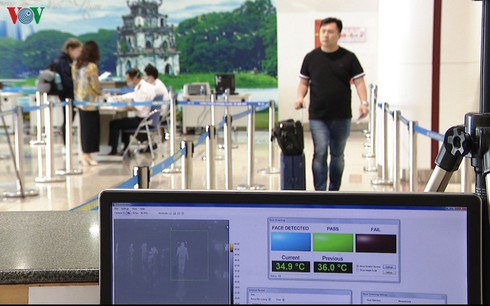 |
| Vietnam has been advised to tighten control over imported cases to avoid the second wave of virus infection like in China, Japan and the Republic of Korea |
Assoc. Prof. & Dr. Nguyen Huy Nga, former director of the General Department of Preventive Medicine under the Ministry of Health, says the nation has been effective in controlling the COVID-19 epidemic so far by quarantining all returnees from abroad upon their arrival. Therefore, all imported cases of the virus were detected upon their arrival and they posed no risk to the community.
Most notably, this success has led to several localities relaxing medical surveillance measures while plenty of citizens have begun to show signs of complacency with regard to epidemic prevention measures by not donning face masks in high-risk areas or failing to use hand sanitiser.
Assoc. Prof. & Dr. Nguyen Dac Phu, senior advisor to the Ministry of Health, describes complacency as a threat to public health, largely due to the COVID-19 evolving in a complex manner globally, meaning the country remains at risk of a second wave. He advises lessons to be learnt from places where the virus has reoccurred, such as in China, Japan, and the Republic of Korea in order to keep it at bay.
“After nearly two months the epidemic was brought under control in Beijing without new community infections, COVID-19 has recurred, raising public concern about the second wave of virus infection. This has given us a valuable lesson,” says Phu. “We should seriously put in place epidemic prevention measures to avoid falling into a similar situation.”
According to Phu, although all imported cases are placed in quarantine upon their arrival, the country must be more vigilant against sources of infection entering from outside.
Specialists believe that preventive health care undoubtedly plays a vital role in controlling the spread of infectious diseases, including COVID-19. If preventive health care, as well as other drastic measures, had not been undertaken in the initial phases, it is highly likely that the nation would have suffered serious consequences caused by the epidemic.
“More investment should pour into human resources and medical equipment from the central to grassroots levels to make preventive health care better,” Phu states. “Respiratory diseases like COVID-19 greatly rely on the human factor. The epidemic will be brought under control if preventive health care is given full attention, and vice versa.”
Meanwhile, Assoc. Prof. & Dr. Huy Nga stresses the importance of being proactive in order to swiftly and effectively address any possible worst-case scenarios.
“Given the current context, Vietnam should maintain its tight control of imported cases while simultaneously detecting any possible cases in the community early by increasing medical surveillance of cases with virus-like symptoms,” Nga recommends. “If any locally transmitted cases are detected, the affected areas should be quarantined to prevent the virus spreading further among the community.”
According to health specialists, all regulations relating to the COVID-19 should be fully observed. These measures include all citizens being subject to a full 14-day quarantine upon entry, foreign experts being quarantined in a separate place, while those in quarantine must be tested for the virus every two days.
In addition, residents should strictly adhere to epidemic prevention measures as we move into the ‘new normal’, this includes wearing face masks in public places, thoroughly washing hands with soap or sanitiser, and filling out health declaration forms. VOV